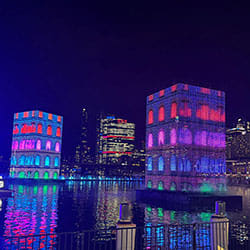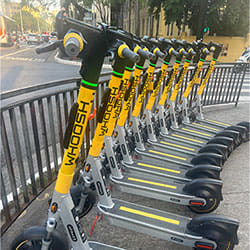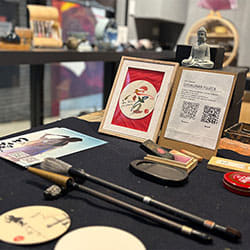There are actually a lot of different desserts in Thailand, but mango sticky rice is incredibly popular at the moment—since mangos are in season during the Thai summer (which is happening now from March to May). So you can find mango sticky rice everywhere.
Other countries in Southeast Asia like Laos and the Philippines have the same dish, but it’s said that it probably originated in northern Thailand.
This is because traditional rice-producing regions use regular or sticky rice—which is of course the staple food there—and then mix in fruit to create desserts. Mango sticky rice is just one example of this.

The Thai name of the dessert is khao niaow ma muang, which means “sticky rice topped with mango and coconut milk” (khao niaow is the word for sticky rice, and muang means “mango”). It contains sticky rice, mango, salt, sugar, coconut milk, and other ingredients. Sticky rice originates in the Chiang Rai province of northern Thailand, and a long, thin variety called Khiaw Ngoo is the most popular. There are many different types of mangos as well, and while the dessert traditionally uses the sweet-tart Ok rong mango, they’ve gotten expensive—so cheaper varieties are used nowadays. The Namdokmai variety, also known as “golden mango,” is known for its yellow color with a sharp, pointed tip and appreciated for its fiberless flesh and deliciously sweet flavor. Mangos are best between March and May, when they are at peak sweetness and available everywhere.


People often ask me whether the sticky rice is tough. You might think so, but we make it tender by first steaming it, then mixing it with coconut milk, salt, and sugar and softening it for another twenty minutes or so (the Thai people call this kind of sticky rice khao niaow moon). The best way to eat it is just like that, with mango cut into bite-size pieces and coconut milk poured over the mango and sticky rice for added sweetness. Mango sticky rice is a delicious dessert, but you’ll run into problems if you eat too much of it. Unripe mango has vitamin A, vitamin E, and fiber, which helps with elimination. But sticky rice and coconut milk are packed with calories, so they’re likely to make you fat. It’s better if you get some exercise after you eat them.
Apparently the dessert has been around for 200 years. Even today, regular families and specialty shops guard their own secret recipes. The best time to eat mango sticky rice is summer, and it’s a popular menu item during this time. Sometimes you see durian used instead of mango. Ice cream desserts made to smell and taste like mango sticky rice are also really popular.
How popular? Don’t take my word for it—it was featured on CNN’s 2018 program on the 50 best desserts around the world, where famous dessert chef Jen Rose Smith ate her way around the world for CNN. Of course Thai mango sticky rice and water chestnuts in coconut milk made the list!
In more recent news, from April 30 to May 31, Thai Airways apparently served mango sticky rice in first class on their flights between Bangkok and London and even in business class on their flights between Bangkok and Europe.
One last question—do you pour the coconut milk over the mango? Or over the sticky rice? It’s a fun question that people still debate even today. Which would you choose?






























































